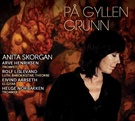
Anita Skorgan has given us everything from light hearted disco tunes in the late 70’s, to some of the 80’s most popular songs with ex Jahn Teigen. Then a turn in her career saw Ms Skorgan distance herself in many ways from her musical past as she set out to reinvent herself and explore new avenues, musically speaking.
For quite some time now Anita Skorgan has been a name assosciated with quality, specialising in music with religious and spiritual undertones, further supported by her touring of numerous churches in the run up to Christmas. And the public has lapped it up in droves. It has been 10 years since her last proper album, not counting the two compilation albums released in the mean time. Reviews in the press have been extremely varied, many applauding her for her efforts claiming that this album is quite unlike anything we’ve ever heard from her before. The critics are not wrong there…
Det Går en Elv (A River Flows) is a song based on a traditional Norwegian folk tune, which sets off the album with an intense, atmospheric almost sacral tone. With very sparse accompagniment, this first track shows just how pure Anita’s voice can sound, giving national treasure Sissel Kyrkjebø a run for her money. This is a tune that transports the listener through time and space, giving a perfect setting for reflection and contemplation. The second track, Av Kjærlighet (Out Of Love) alters the tone of the album, with rhythms coming more to the fore. The addition of strings and a somewhat erratic tempo in places lends the song a jazzy air and as a tribute to love, the text is quite abstract, but packed with meaning, especially for Norwegian speakers, taking recent national events into consideration.
On Paradis Senkes Over Jorden (Paradise Descends Upon Earth), the same kind of percussion is used as on the previous track, but this song sounds altogether more like a psalm, with Anita singing of how the breath of God can make any lover dizzy. A mournful trumpet solo pierces the meandering melody, with this being on the whole a very demanding track to listen to. The general tone continues in similar vein with the fourth song, Alene Gud (God Alone), although the shuffling snare drum and the more predictable rhythm makes for a much easier music listening experience. God alone can reveal everything, Anita exalts her maker, but is in severe danger of coming across as sanctimonious.
On Frihet (Freedom), Celtic influences and surprisingly enough Oriental influences can clearly be heard along with such exotic instruments as the sitar as well as a breathy trumpet. A more defined yet much darker track in terms of tune, this is without doubt one of the more accessible numbers on the album. Next up is I Jordens Dyp (In the Depth of the Earth), the tone finally lightens up a little with the song being more reminiscent of a lullaby with a harp accompaniment as Anita sings of powerful forces breaking free, how every creation has to stand up for itself. Still with jazz undertones, I Jordens Dyp helps to balance the album to a certain extent from what could all to quickly become a far too laden and sombre affair.
Vi Er Elskere (We Are Lovers) takes a step away from the religious air so often present on the album and with crashing waves and an hypnotic backing accompagniment, almost sounding like the ticking of a clock. Even though the track distances itself from the rest of the tracks heard thus far, it still makes for extremely challenging listening…and a word of warning…if you’re feeling down and low, then avoid this track at all costs! You would expect a song about being lovers to be full of joy and happiness, how wrong can you be? Alt Hva Gud Har Skapt Er Rent (Everything Which God has Created is Pure) continues in much the same "joyful" mode and personally for me was make or break for the album. OK, it’s applaudable that the creators wanted to make something atmospheric, but there’s
a fine line between captivating the listener and seding them to sleep. Uplifting this ain’t…bordering on the sanctimonious, if you ask me.
Next up is Dansen Går i Ring (The Dance Goes in Circles), yet again a track that does nothing to lift your spirits. The introduction with spanish guitar sounds promising at first, but then you hear once again the all too familiar rhythms kick in, and as a listener, you know what the track has in store…there are no surprises, and I for one managed to listen to the entire track, but only just, without hitting the skip button. The album draws to a close with the title track, På Gyllen Grunn (On Golden Ground) with, if it was at all possible, an even slower track which won’t exactly have you jumping for joy.
All in all, På Gyllen Grunn is an exceptional piece of work in terms of Anita Skorgan’s career. In terms of artistic integrity and ingenuity, there’s no denying that Ms Skorgan deserves all the praise she has received so far. However, the album is perhaps a tad too specialized to make any impact on the record buying market, not that it was either the artist’s or record label’s intention. If you’re in search of an intense listening experience with something different on offer, then you can easily give this album a go. However be warned – although intense in places, the album quickly becomes extremely monotonous and ended up becoming one long yawn as far as I’m concerned. I’m all for music being challenging and provoking reactions and emotions with the listener, but På Gyllen Grunn was sadly just far too heavy to digest for this listener and probably demands an extremely special frame of mind in order to be properly appreciated.



















